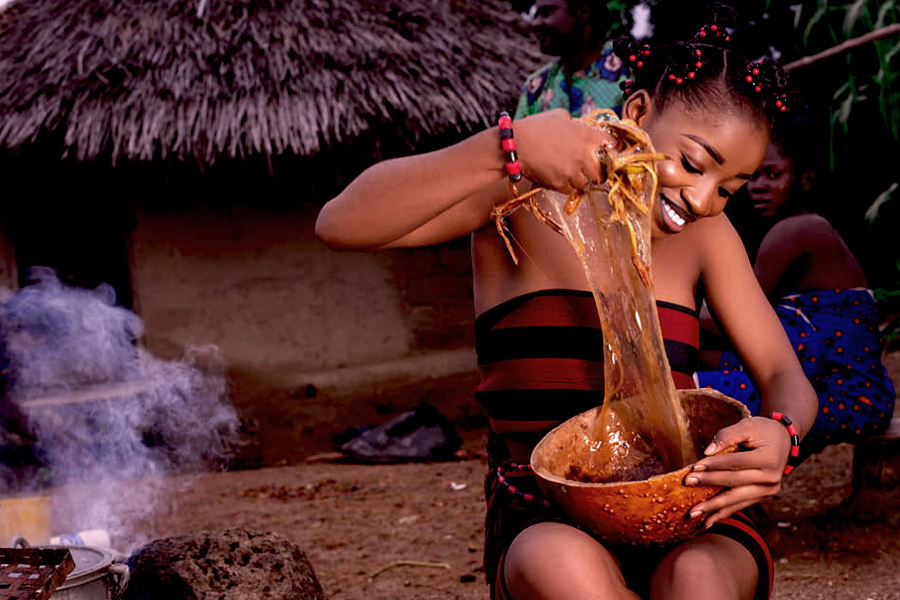
The Idoma’s Special Delicacy: Okoho Soup
One experience I will never forget from our vacations as a family to the village for Christmas celebration is the big basin full of wraps of pounded yam and okoho soup to celebrate that families are home and together. At that time, eating okoho soup was an interesting battle, take my word for it. It requires a special technique to master the act of fetching that soup because of its slippery nature. That’s when you understand the part of the bible that says, “For the weapons of our warfare are not carnal, but mighty in God through the pulling down of strongholds.” (2 Corinthians 10:4, KJV)
- Bier And Akpukpa Is For Lovers Of Good Natural Food
- Genger Delicacy, Its Healthy Benefits And How To Prepare It
- The Hidden Secret Of The Benue Woman
Okoho soup, which is known to be the main traditional soup of the Idoma people of Benue State, is normally prepared with bush meat or smoked meat and finally crowned with pounded yam (onihi). Okoho soup is made from the stem of a plant(intriguing right?) known by the Idomas, Igalas and Igbos as Okoho, to the Hausas as Dafara or Latutuwa, to the Yorubas as Agara or Orogbolo and goes by the botanical name Cissus populnea belonging to the family of Amplidaceae. This plant grows up to three meters tall and is a semi–climber. It grows in the savannah and is found in countries such as Senegal, Uganda, Sudan, and Nigeria. The stems of the plant are cut and used for the preparation of the soup as the main ingredient.
Health Benefits Of Okoho (Cissus Populnea)
Okoho has a well full of highly medical uses, including the treatment of indigestion and venereal diseases that could be responsible for infertility, amongst others.
The stem – has been reported to contain phytochemicals such as tannins, cyanogenic glycosides, flavonoids, anthraquinones, carotenoids and carbohydrates and vitamins for the treatment of respiratory issues, ulcers, mouth sores, throat sores, and sore breast; it has anti-inflammatory and antioxidant properties.
The root – is used traditionally in the management of Sickle cell disease, skin disease, infected wounds, and boils implying that it exhibits antibacterial functions.
Ingredients You Need For Preparing Okoho Soup
The main ingredient needed for preparing Okoho Soup is okoho stem.
Two other important ingredients include abahi (egusi balls) and the special Idoma spice okpehe (African Mesquite or iron tree), which also goes by the botanical name “Prosopis Africana”. The rest are basic ingredients needed for preparing all soups in Nigeria. Let’s use my grandmother’s recipe.
- Bushmeat; grasscutter or alligator or smoked meat.
- Dried fish.
- Okoho stick (stem).
- Okpehe (locust beans) as the Tiv people call it “Gbaaye”.
- Dried pepper.
- Seasoning cube.
- Water.
- Salt to taste.
- Abahi (Egusi balls).
“A meal that is not only nutritious but also tasty, sums up a perfect meal.”
How To Prepare Okoho Soup
Peel off the bark from the okoho stick by scratching the body gently with a knife.
Place your peeled okoho stick on any clean safe surface and hit with a pestle gently to loosen it. Remove the rope-like layer, then discard the stick.
Wrap your rope like layer together like a sponge and place in a bowl, add hot water and allow to sit for 8 – 10 minutes.
If it is confirmed that it’s lukewarm enough to put your hand into, begin to squeeze it inside the bowl (squeeze until the water becomes thick and slippery, then set aside).
Parboil your bush meat, add seasoning cube, dried pepper and salt to taste. Allow to boil. Add your pounded okpehe and dried fish and allow to cook.
To prepare Abahi (Egusi balls): Grind your egusi with crayfish, add a little hot water to the grinded egusi and begin to knead until it brings out the oil. This mixture should not be too strong, a moldable consistency will do.
Mould into balls and add to your pot of already boiling meat. Allow cooking for some minutes.
Remove your meat and moulded egusi from the pot while boiling and set aside.
Now remove the okoho rope from the already squeezed okoho leaving the thick liquid. Pour liquid into your soup and stir for 5 minutes.
Put on low heat and add back your meat and moulded egusi stirring together for some minutes.
Turn off the heat. Okoho Soup is ready!!!!!!!!
Serve with any swallow of your choice preferably pounded yam.
Okoho is quite slippery if it’s your first time you have to eat with patience or tell your Idoma friend to teach you.
Fun Fact About Okoho
Okoho aids microbial activities which may cure a lot of sexually transmitted infections that could be said to be liable for infertility…no wonder the Idoma people are so fertile!
I am thinking you will agree with me when I say “A meal that is not only nutritious but also tasty, sums up a perfect meal”. No wonder it’s so special to the Idoma people! I can’t wait to hear all about your experience when you try it out!

a Fella
the weapons of our warfare are not canal LOL
Jayada
This article is not only enlightening but also interesting.Idoma to the world!!!
Agbo Innocent
Nice one… More grace
Linda
This is the exact article for okoho well narrated ????????????????
Ajebo
Awwn idoma to the world
So proud to be idoma
Esther
Oh wow! Interesting facts.The bible quotation for me lol.
Julian
Wow…okoho soup preparation has been made easy for me, thank you.
Nicholas
This is awesome
Aondohemba
‘For the weapons of our warfare are not carnal got me laughing so hard’. This is an amazing and innovative article.
Vera
Aww..this is well detailed
Elijah Fabian Mbaukaan
There are certain delicacy you don’t need someone to tell you story.a taste will convince you with a bottle of chilled water to wash it down.
Amuche
Okoho did the major for me and my friends who came down to celebrate me in Otukpo in 2020 December.
I’m glad the all loved the soup, and give it a pass mark.
Igoche
It’s the botanical name of okoho for me (Cissus populnea ) overall it was a good read kudos
What Being Afro-Vegan Has Taught Me About My Culture | AZ Magazine
[…] my love for my traditional food in the ridiculously slimy bowls of okoho soup with melon chunks and mushrooms, paired perfectly with the rubbery mush of well-pounded y… is how I am embracing my cultural strengths. Learning to adapt my cultural food to suit my vegan […]
Isaac Sarah
i will try it
Akpulu S PETER
God bless you for this article. The back ground picture matches very well the narration
Chef Nomdora
Thank you so much, I’ll be trying the recipe tomorrow. I hope it comes out great